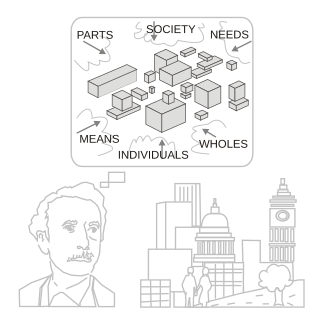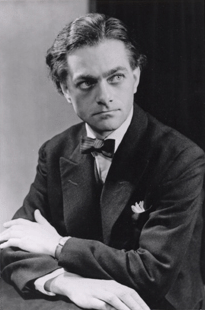Related Research Articles

Anthony Stafford Beer was a British theorist, consultant and professor at the Manchester Business School. He is best known for his work in the fields of operational research and management cybernetics.

William Ross Ashby was an English psychiatrist and a pioneer in cybernetics, the study of the science of communications and automatic control systems in both machines and living things. His first name was not used: he was known as Ross Ashby.

Systems science, also referred to as systems research, or, simply, systems, is a transdisciplinary field concerned with understanding systems—from simple to complex—in nature, society, cognition, engineering, technology and science itself. The field is diverse, spanning the formal, natural, social, and applied sciences.

Sociocybernetics is an interdisciplinary science between sociology and general systems theory and cybernetics. The International Sociological Association has a specialist research committee in the area – RC51 – which publishes the (electronic) Journal of Sociocybernetics.
Second-order cybernetics, also known as the cybernetics of cybernetics, is the recursive application of cybernetics to itself and the reflexive practice of cybernetics according to such a critique. It is cybernetics where "the role of the observer is appreciated and acknowledged rather than disguised, as had become traditional in western science". Second-order cybernetics was developed between the late 1960s and mid 1970s by Heinz von Foerster and others, with key inspiration coming from Margaret Mead. Foerster referred to it as "the control of control and the communication of communication" and differentiated first order cybernetics as "the cybernetics of observed systems" and second-order cybernetics as "the cybernetics of observing systems".
Engineering cybernetics also known as technical cybernetics or cybernetic engineering, is the branch of cybernetics concerned with applications in engineering, in fields such as control engineering and robotics.

Andrew Gordon Speedie Pask was a British cybernetician, inventor and polymath who made during his lifetime multiple contributions to cybernetics, educational psychology, educational technology, epistemology, chemical computing, architecture, and the performing arts. During his life he gained three doctorate degrees. He was an avid writer, with more than two hundred and fifty publications which included a variety of journal articles, books, periodicals, patents, and technical reports. He also worked as an academic and researcher for a variety of educational settings, research institutes, and private stakeholders including but not limited to the University of Illinois, Concordia University, the Open University, Brunel University and the Architectural Association School of Architecture. He is known for the development of conversation theory.
Ranulph Glanville was an Anglo-Irish cybernetician and design theorist. He was a founding vice-president of the International Academy for Systems and Cybernetic Sciences (2006–2009) and president of the American Society for Cybernetics (2009–2014).

Management cybernetics is concerned with the application of cybernetics to management and organizations. "Management cybernetics" was first introduced by Stafford Beer in the late 1950s and introduces the various mechanisms of self-regulation applied by and to organizational settings, as seen through a cybernetics perspective. Beer developed the theory through a combination of practical applications and a series of influential books. The practical applications involved steel production, publishing and operations research in a large variety of different industries. Some consider that the full flowering of management cybernetics is represented in Beer's books. However, learning continues.

Stuart Anspach Umpleby is an American cybernetician and professor in the Department of Management and Director of the Research Program in Social and Organizational Learning in the School of Business at the George Washington University.
Michael Christopher Jackson OBE is a British systems scientist, consultant and Emeritus Professor of Management Systems and former Dean of Hull University Business School, known for his work in the field of systems thinking and management.
Peter Andrew Corning is an American biologist, consultant, and complex systems scientist, Director of the Institute for the Study of Complex Systems, in Seattle, Washington. He is known especially for his work on the causal role of synergy in evolution.
Richard Ferdinand Ericson (1919–1993) was an American organizational theorist, professor emeritus of management and director of the Interdisciplinary Systems and Cybernetics Project, Program of Policy Studies in Science and Technology at George Washington University in Washington, D.C.

Cybernetics is a wide-ranging field concerned with circular causal processes such as feedback. Norbert Wiener named the field after an example of circular causal feedback—that of steering a ship where the helmsman adjusts their steering in response to the effect it is observed as having, enabling a steady course to be maintained amongst disturbances such as cross-winds or the tide.
Yi Lin, also known as Jeffrey Forrest and Jeffrey Yi-Lin Forrest, is a professor of mathematics, systems science, economics, and finance at Pennsylvania State System of Higher Education (SSHE) and at several major universities in China. Lin has been an active researcher in the field of systems science since mid-1980s and serves as the founder and president of the International Institute for General Systems Studies (IIGSS).

Alexander Laszlo (*1964) is a polycultural systems scientist, currently residing in Argentina.
Markus Schwaninger is an Austrian economist and Professor of Management at the University of St. Gallen, Switzerland, and Director of the International World Organization of Systems and Cybernetics. He is known for his co-authorship of the St. Galler Management-Model.
Autonomous agency theory (AAT) is a viable system theory (VST) which models autonomous social complex adaptive systems. It can be used to model the relationship between an agency and its environment(s), and these may include other interactive agencies. The nature of that interaction is determined by both the agency's external and internal attributes and constraints. Internal attributes may include immanent dynamic "self" processes that drive agency change.

Jason Jixuan Hu, is a Chinese American cyberneticist, independent scholar and managing director of WINTOP Organizational Learning Laboratory, and organizer/facilitator of the Club of Remy(Youtube Channel). He is noted for his work on "cognitive capacity in human communication, conflict resolution and cooperation solicitation," and on view on distance education in America.
References
- ↑ Umpleby, Stuart. "Reviving the American Society for Cybernetics, 1980-1982" (PDF).
- 1 2 O'Hallarn, Brendan. "Built From the Ground Up: The First 50 Years of Engineering at Old Dominion University" (PDF). pp. 58, 105.
- ↑ "ASC Executive Board - American Society for Cybernetics". asc-cybernetics.org. Retrieved 2017-03-11.
- ↑ "The IASCYS Academicians 2016 Yearbook" (PDF).
- 1 2 3 4 "IU East interim leader Richards makes career of mixing scholarship with administrative assignments | Media Relations". www.iue.edu. Retrieved 2017-03-13.
- ↑ O' Hallarn, Brendan. "Built From the Ground Up: The First 50 Years of Engineering at Old Dominion University" (PDF). p. 68.
- ↑ "Wallops Island". www.astronautix.com. Archived from the original on August 20, 2016. Retrieved 2017-03-11.
- ↑ "Bridgewater State College". Bridgewater Magazine. 8:1: 7. Fall 1997.
- ↑ "Larry Richards named interim chancellor at IU East". newsinfo.iu.edu. Retrieved 2017-03-11.
- ↑ "Faculty Profiles - Faculty & Staff - Indiana University East". www.iue.edu. Retrieved 2017-03-11.
- ↑ "Previous Chancellors - Office of the Chancellor - Indiana University East". www.iue.edu. Retrieved 2017-03-11.
- ↑ "Laurence D. Richards to be appointed interim vice chancellor and dean at IUPUC". www.iupuc.edu. Retrieved 2017-03-13.
- ↑ "Laurence Richards". LinkedIn.
- ↑ Constraint-Theory-An-Approach-to-Policy-Level-Modelling.
- ↑ Richards, Laurence D. (1996-12-01). "Analysis of Robustness in the Formulation of Technology Strategy". Engineering Management Journal. 8 (4): 21–32. doi:10.1080/10429247.1996.11414915. ISSN 1042-9247.
- ↑ Larry, Richards (2013). "Idea avoidance: reflections on a conference and its language". Kybernetes. 42 (9/10): 1464–1469. doi:10.1108/K-09-2012-0060.
- ↑ "School for Designing a Society :: Organizers and Presenters". www.designingasociety.org. Retrieved 2017-03-11.
- ↑ Richards, Larry. "Beyond Planning: Technological Support for a Desirable Society". Systemica.
- ↑ Richards, Larry. "Difference-making from a Cybernetic Perspective: The Role of Listening and Its Circularities". Cybernetics and Human Knowing.
- ↑ "The Wiener Gold Medal of the American Society for Cybernetics" (PDF). American Society for Cybernetics.
- ↑ 費道聞, Thomas Fischer; Richards, Larry (2014). "From Goal-oriented to Constraint-oriented Design: The Cybernetic Intersection of Design Theory and Systems Theory (with Thomas Fischer)". Leonardo. 50 (1): 36.
- ↑ Richards, Larry. "Designing Academic Conferences in the Light of Second-Order Cybernetics". Constructivist Foundations.
- ↑ Larry, Richards (2014). "Education as a subversive activity: a proposal". Kybernetes. 43 (9/10): 1392–1398. doi:10.1108/K-07-2014-0149.
- ↑ Richards, Larry. "The Anticommunication Imperative". Cybernetics and Human Knowing.
- ↑ "Protected Blog › Log in". pearlheatherforge.wordpress.com. Retrieved 2017-03-11.
- ↑ Richards, Larry. "Connecting Radical Constructivism to Social Transformation and Design". Constructivist Foundations.
- ↑ Richards, Larry. "Propositions on Cybernetics and Social Transformation". Systems Research.
- ↑ "The Systems Approach in an Information Society: A Reconsideration*". ResearchGate. Retrieved 2017-03-11.
- ↑ "Cybernetics and the management science process". ResearchGate. Retrieved 2017-03-11.
- ↑ "A Language for Policy-Level Modelling". ResearchGate. Retrieved 2017-03-11.